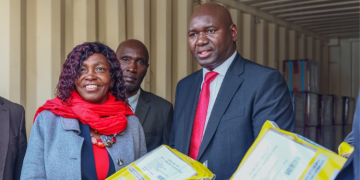The Directorate of Criminal Investigations (DCI) has issued a statement clarifying recent allegations of spying on Kenyans’ phones and other devices.
In a statement on Friday, September 12, 2025, the DCI dismissed an exposé published by the Daily Nation as false.
“The Directorate of Criminal Investigations wishes to address the misleading claims published in today’s Daily Nation regarding alleged surveillance of mobile phones and other digital devices by the DCI.
We categorically refute these claims as false and sensational,” the DCI stated.
The DCI further claimed that the article was intended to mislead the public and undermine the integrity of the institution.
The investigative agency added that, while it cannot disclose specific details related to the allegations at this time, the matter is currently before the courts.
DCI Denies Spying on Kenyans’ Phones
Additionally, the DCI reiterated that it operates strictly within the confines of the law and does not engage in activities that compromise constitutional principles.
“We want to assure the members of the public that the Directorate of Criminal Investigations operates strictly within the confines of the law. Our commitment to upholding the rights and privacy of all Kenyans is unwavering, and we do not engage in any activities that compromise these constitutional principles,” said the DCI.
Also Read: DCI Celebrates Officer with PhD Who Wrote Her Way to the Top
The statement follows a Daily Nation article titled “How the DCI Spies on Your Phone”, which alleges the use of various surveillance tools by the agency to monitor communication, track movements, and remotely access files.
According to the article, spyware tools reportedly used in Kenya include Pegasus, FinFisher (FinSpy), Circles, and FlexiSpy. These tools allegedly allow the DCI and other security agencies to intercept phone calls, read text and WhatsApp messages, track real-time locations, and access emails, photographs, and documents.
Further, the spyware is reported to have the capability to remotely activate microphones and cameras on mobile devices to secretly record conversations and video.
Investigative Agency Accused of Spying on Kenyans
The article also cites instances in which spyware was allegedly used to monitor individuals under arrest. One such example involves the filmmakers behind the BBC documentary Blood Parliament.
“When the makers of the documentary Blood Parliament got their phones back from the Directorate of Criminal Investigations on July 10, 2025, they expected more than just missed calls and text messages.
The mobile phones had been seized on May 2, 2025, when DCI officers arrested Mr. MarkDenver Karubiu, Mr. Bryan Adagala (documentarians), Mr. Nicholas Wambugu (cinematographer), and graphic designer Christopher Wamae,” reads an excerpt from the publication.
Also Read: DCI Issues Update on Shooting of City Lawyer Kyalo Mbobu
After the devices were returned, the four handed them over to Citizen Lab, a Canadian internet watchdog based at the University of Toronto, for forensic analysis.
Two months later, Citizen Lab’s report allegedly revealed that FlexiSpy—a commercially available spyware—had been installed on the devices.
“We know the spyware that was installed on the devices. The full report will disclose all findings once we get leave. We also intend to issue summons to the forensic lab and the DCI to understand exactly what the chain of custody was,” Mutiso stated.
Follow our WhatsApp Channel and X Account for real-time news updates.


















































![Senator Allan Chesang And Chanelle Kittony Wed In A Colourful Ceremony [Photos] Trans Nzoia Senator Allan Chesang With Channelle Kittony/Oscar Sudi]( https://thekenyatimescdn-ese7d3e7ghdnbfa9.z01.azurefd.net/prodimages/uploads/2025/11/Trans-Nzoia-Senator-Allan-Chesang-with-Channelle-KittonyOscar-Sudi-360x180.png)























